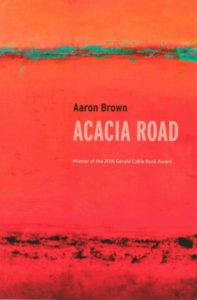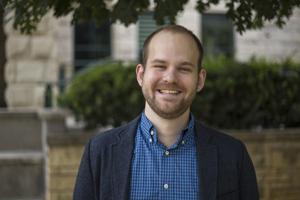Chad is a landlocked country in north central Africa. Once a part of France’s colonial empire, it gained independence in 1960. But it’s been torn by civil war, an invasion by Libya on the north, and the civil war in Sudan, which sent tens of thousands of refugees to Chad. About 55 percent of the country is Muslim, and about 41 percent is Christian. It’s also split geographically between an arid north and a tropical south.
This is where poet Aaron Brown grew up. Born in Texas, he spent his childhood and teen years in Chad. It’s both his country and not his country. In the 47 poems of Acacia Road, Brown allows his eye and his heart to range over Chad’s people, its geography, its seasons, and its customs. It’s a place where “clouds empty like a jug”; where naming ceremonies are held for children and you hear the name Sakina or Serenity whispered in your ear; where looters might break into your house in the capital; and where in the “spacious halls of morning” one plays a harp “beneath wind-lifted curtains.”
These poems allow you to see and feel the heat, the wind, and the rain. And in the tropical south, the rain comes in the monsoon or Kharrif season.
During Kharrif

the skin ripe and firm, and sliced
until we had a plateful of gold.
We puffed out our bellies as if pregnant
and laughed, talking politics and soccer
over glasses of mango juice.
Outside, rainy season winds scattered
twigs and hajlij seeds across the earth,
a thickened cloud hovered like soot
over the horizon, threatening to spill its
entrails upon the leaves outside my door.
The yard would erode, bricks disintegrate
in a wash of sand and rain—a deluge
that could not drown the whir of the blender,
the scoop of spoons in the sugar jar.
It’s an extraordinarily beautiful collection of poems, full of vivid scenes and, at times, what sounds very much like music. And it goes on for page after page, with scenes, images, people, sounds, and smells stepping forth and allowing you to sense the place with the poet’s heart. It’s a beautiful place, a tragic place, and a place that is loved.

Aaron Brown
Brown is an assistant professor of English and director of the Writing Center at Letourneau University in Longview, Texas. In addition to Acacia Road, he’s also published the poetry chapbook Winnower, the novella Bound, and numerous articles for such publications as Ruminate Magazine and The Millions. His poetry has been published in World Literature Today, Tupelo Quarterly, Waxwing, Cimarron Review, Transition, and others. Acacia Road won the 2016 Gerald Cable Book Award from Silverfish Review Press. Brown received his MFA (poetry) degree from the University of Maryland. He lives with his family in Texas.
Acacia Road strikes us with wonder. It tells large stories and small stories. It allows us to peer down the rows of acacia trees, sit next to the grandmother making bread, and listen to the workers singing their sorrowful songs.
Photo by SMcD22, Creative Commons, via Flickr. Post by Glynn Young.
__________________________

“I require all our incoming poetry students—in the MFA I direct—to buy and read this book.”
—Jeanetta Calhoun Mish
- Longfellow’s “Paul Revere’s Ride”: Creating a National Legend - April 17, 2025
- Poets and Poems: Katie Kalisz and “Flu Season” - April 15, 2025
- Poets and Poems: Michelle Ortega and “When You Ask Me, Why Paris?” - April 10, 2025

Megan Willome says
I’ve read about him and his experience growing up in Chad somewhere. I think he used to be at Baylor University.
Will Willingham says
“It’s both his country and not his country.” So much in that sentence. For such obvious reasons in a case like Aaron Brown. But for so many others, for so many other reasons, this can feel so true.